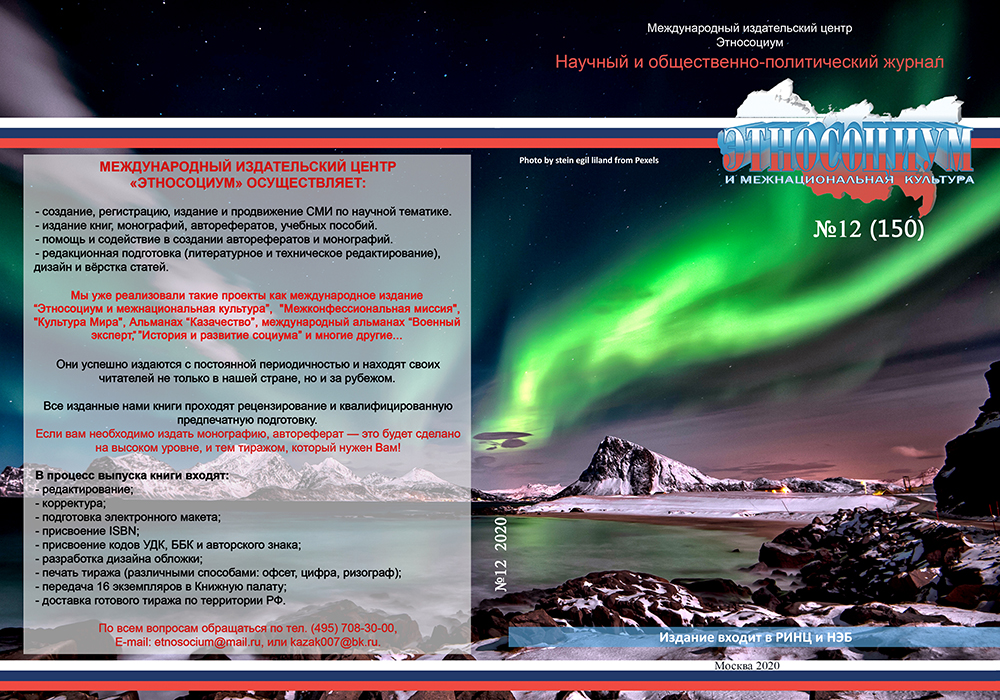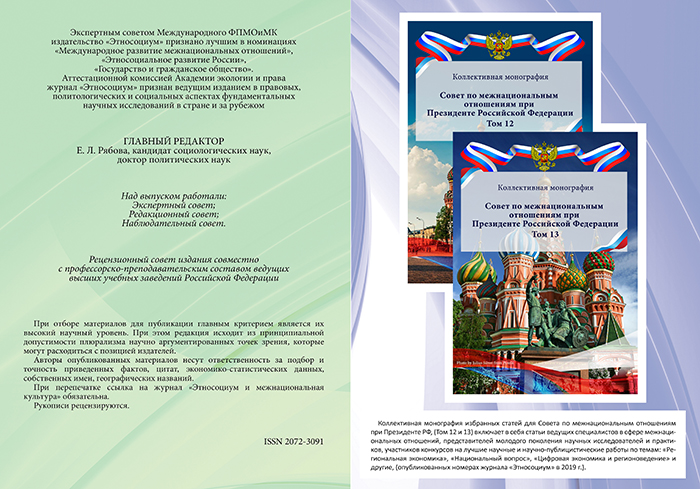

Content
|
COUNCIL OF INTERNATIONAL RELATIONSHIP
|
|
|
Rodionov M.A., Volkova T.A. Political leaders of states during the Second World War (countries - participants of the "Great alliance")
|
9
|
|
Olifirenko E.P. Theoretical foundations and practice of implementing measures to prevent extremist crimes
|
33
|
|
ACTUAL PROBLEMS OF MODERN SOCIETY
|
|
|
Polonchuk R.A. Methods for research and forecasting of military potential and its elements
|
42
|
|
REGIONAL STUDY
|
|
|
Panferova E.V., Shelispanskaya E.V. Psychological features of adaptation potential of young police officers
|
53
|
|
INTERNATIONAL RELATIONSHIPS
|
|
|
Borishpolets K.P. Nationalism in world politics: adapting to current changes in the international arena
|
61
|
|
Umerov D.A. Foreign experience of harmonizing strategy and tactics in foreign policy
|
70
|
|
Shashok L.A. Ethnoreligious identity in the ideology of the Taliban movement in 1994-1996
|
79
|
|
CONFERENCE
|
|
|
Kondratyev V.V. Current state and prospects of Russian-Iranian cultural and humanitarian cooperation in the Caspian Region
|
91
|
|
Komleva E.A. Promising areas of scientific and practical cooperation between Russia and Iran in order to ensure the energy transition
|
99
|
|
REVIEW
|
|
|
Biryukov S.V., Ponomarenko B.T. Evolution of the radical Islamist Taliban movement: from its founding to the present day
|
106
|
|
Abstracts
|
111
|
|
Authors
|
120
|
|
Requirements to materials submitted to the international publishing house "Etnosocium"
|
123
|
A retrospective study of the features of the functioning of the military-political elites of the states that won the Second World War was carried out. The main attention is paid to the activities of the leaders of the “big three” states both in the pre-war period and during the war.
Keywords: political administration, war, geopolitics, state and military administration, military-political elites, information confrontation, intelligence operations, cold war.
Russian legislation guarantees citizens of our country protection from criminal attacks, including extremist ones. Currently, there is a tendency to increase this type of crime, as evidenced by official statistics. This article is devoted to the disclosure of the characteristic features of extremism, the study of the theoretical foundations of state policy to counter extremist crimes. Results: a characteristic of extremism is given and analysis of the current state of the domestic legal framework is carried out for a more complete understanding of the features of the negative phenomenon under consideration.
Keywords: extremism, crimes of extremist orientation, extremist organization, counteraction to extremism.
The article discusses the main methods of studying the military potential of the state. Based on the analysis of domestic and foreign sources, the author considers predictive methods for studying the military potential of the state. The most frequent methods used by domestic and foreign think tanks to assess the military potential of the state have been identified.
Keywords: national security, research, forecasting, methods, methodology, model, military construction, state potential.
In connection with the changes occurring in all sectors of the country's life that are of an innovative nature, the question of studying the peculiarities of the socio-psychological adaptation of employees of organizations is particularly acute. The problem of increasing the adaptive capacity for those workers who have to carry out their service in constant stressful conditions is highly significant. This category of employees includes law enforcement officers. The professional activities of employees of internal affairs bodies imply constant adaptation to the new conditions of service, increasing requirements for the volume and quality of solving service tasks. In this regard, monitoring the adaptation characteristics of police officers is necessary throughout their entire service life in the system of internal affairs bodies.
Keywords: professional activity, adaptation potential, young police officers.
The current situation suggests an additional comprehension of the role of nationalism as an actor in world politics. The relevance of this topic is due to the growth of nationalist challenges in all regions of the world and the uncertainty of the prospects for overcoming contradictions on national grounds. At the same time, nationalism at the beginning of the 21st century as an ideological and political project differs in its characteristics from traditional formats.
Keywords: world politics, nationalism, universalism, globalization, integration, global governance.
The countries of the world and integration unions pay great attention to the combination of the strategy and tactics of their foreign policy activities. The lack of coordination between them causes serious damage to national interests of any country. Therefore, in foreign countries, various means and methods are used to harmonize the strategy and tactics of their foreign policy. An information policy is being carried out to make population understand the need of current government actions in the context of long-term trends. Institutional systems are being created whose task is to combine strategic goals and tactical actions. An example of such a system is the Strategic Foresight created within the European Union. Quantitative instruments are being developed to measure the relationship between strategic goals and governments’ tactical actions. An example of such a tool is the Five Connectivity Index used by China in developing the Belt and Road Initiative. This experience may be of considerable interest to Russia.
Keywords: strategy, tactics, Germany, European Union, China, demography, infrastructure, Strategic foresight, Five Connectivity Index, Belt and Road Initiative.
This article is devoted to the analysis of factors that influenced the radical Islamic «Taliban» movement (currently considered a terrorist organization and banned in the Russian Federation) from 1994 to 1996. The combat capabilities and prerequisites for the transformation of a religious movement into a political entity are analyzed from the standpoint of ethnic and religious factors. Particular attention is paid to the Pashto issue and the consideration of the basic principles of tribal interaction in Afghanistan.
Keywords: Afghanistan, Taliban, radicalism, fundamental Islam, ethnos, civil war.
The article provides an overview of Russian-Iranian cultural and humanitarian cooperation in 2019-2020. The article analyzes the current state and prospects of development of cooperation between Russia and Iran in the field of science and education, culture and art in the Caspian region.
Keywords: cultural and humanitarian cooperation, the Caspian region, science, education, culture, art, Associations of state universities of the Caspian States.
The author describes common drivers for Russia and Iran that lead these countries to energy transition. The energy directions, development of which within the framework of Russian-Iranian cooperation could stimulate the process of energy transition in two countries, are identified. It is proposed to create an additional communication platform for the organization of stable research and development links between Iran and Russia, with subsequent activation of energy transition in the Caspian region.
Keywords: energy cooperation, energy transition, Russian-Iran interaction, innovations in oil&gas sector.
It is known that Islamic extremism is one of the main causes of the global terrorist threat. For more than four decades, this problem has been especially acute and urgent for the Republic of Afghanistan. In the monograph Shashok L.A. presents the results of a comprehensive analysis of the evolution of the radical Islamist movement "Taliban", the existence and activities of which occupy one of the central places in the modern history and modern life of Afghanistan.
Keywords: Taliban, religion, politics, role, history, results.